
Intelligenza Artificiale
metrics 2024
Exploring the Frontiers of AI Research
Introduction
Intelligenza Artificiale is a prominent academic journal dedicated to advancing the field of artificial intelligence, published by IOS PRESS, a renowned publisher in the scientific community. Based in the Netherlands, this journal's ISSN is 1724-8035 and its E-ISSN is 2211-0097. With a current impact factor that reflects its relevance in the scholarly landscape, it operates in the Q2 quartile of the Artificial Intelligence category as of 2023, which ranks it notably at #200 out of 350 within its field according to Scopus data. The journal provides a valuable platform for researchers, professionals, and students to disseminate and access cutting-edge findings from 2018 to 2024, focusing on the innovative applications and theoretical developments in artificial intelligence. With its commitment to fostering academic dialogue and collaboration, Intelligenza Artificiale is essential for anyone looking to stay at the forefront of AI research and practice.
Metrics 2024
 0.68
0.68 1.90
1.90 1.50
1.50 7
7Metrics History
Rank 2024
Scopus
IF (Web Of Science)
JCI (Web Of Science)
Quartile History
Similar Journals
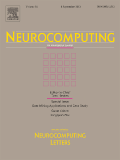
NEUROCOMPUTING
Pioneering Research in Neural and Computational FrontiersNEUROCOMPUTING is a premier academic journal published by ELSEVIER, specializing in the interdisciplinary fields of Artificial Intelligence, Cognitive Neuroscience, and Computer Science Applications. With an impressive impact factor and a Q1 ranking in its relevant categories for 2023, NEUROCOMPUTING is recognized as a leader in fostering innovative research and providing a platform for ground-breaking studies. The journal’s scope covers the convergence of neural computation and artificial intelligence, making it essential reading for researchers and professionals seeking to explore the latest advancements and applications in these dynamic fields. For those interested in the cutting-edge intersection of neuroscience and computational techniques, NEUROCOMPUTING offers a wealth of knowledge that significantly contributes to both theoretical and practical advancements. The journal is dedicated to publishing high-quality, peer-reviewed articles and is an invaluable resource for students and established scholars alike, looking to stay at the forefront of research trends.

Quantum Machine Intelligence
Innovating at the crossroads of quantum computing and machine learning.Quantum Machine Intelligence is a leading academic journal published by Springer Nature, focusing on the rapidly evolving intersection of quantum computing and artificial intelligence. With an impressive impact factor reflected in its prestigious ranking in various categories—Q1 in Applied Mathematics, Computational Theory and Mathematics, and Theoretical Computer Science, alongside Q2 in Artificial Intelligence and Software—this journal serves as a vital platform for disseminating innovative research from 2019 to 2024. Researchers, professionals, and students are encouraged to engage with the journal’s content, which features high-quality peer-reviewed articles that explore theoretical foundations and practical applications of quantum technologies in machine intelligence. Although the journal operates under traditional subscription models, it is committed to advancing open academic discourse and accessibility in the digital age. With Scopus rankings that place it among the top echelons of its fields, the journal is an essential resource for anyone interested in the transformative potential of quantum algorithms and AI.

Cognitive Systems Research
Exploring the Intersection of Mind and MachineCognitive Systems Research, published by ELSEVIER, is a prestigious journal dedicated to advancing the field of cognitive systems, a dynamic intersection of Artificial Intelligence, Cognitive Neuroscience, and Experimental Psychology. With an impressive impact factor and ranked in the Q2 category across multiple disciplines, this journal is recognized for its contribution to fundamental and applied research, making it an essential resource for researchers, professionals, and students alike. The journal's scope encompasses innovative studies that push the boundaries of how cognitive processes are understood and simulated within computational frameworks. With a commitment to fostering open science, articles are made readily accessible, promoting the rapid dissemination of knowledge. As the field evolves from 1999 to 2024, Cognitive Systems Research stands as a pivotal forum for the exploration and development of cognitive theories and systems, welcoming high-quality submissions that encourage interdisciplinary collaboration.
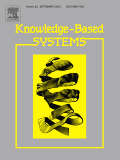
KNOWLEDGE-BASED SYSTEMS
Pioneering Insights in Knowledge Management and Software DevelopmentKNOWLEDGE-BASED SYSTEMS, published by ELSEVIER, is a leading international journal that has established itself as a cornerstone in the fields of Artificial Intelligence, Information Systems and Management, and Software Development. With an impressive track record of over 35 years in publication, this journal is highly regarded for its significant contributions to the understanding and advancement of intelligent systems, providing a platform for innovative research and applications. It boasts a strong impact factor, maintaining a Q1 ranking across multiple categories, including Management Information Systems and Decision Sciences, reflecting its prestige and relevance in the academic community. Researchers and practitioners alike benefit from access to high-quality, peer-reviewed articles that explore the intersection of knowledge management and transformative technologies. The journal's commitment to fostering interdisciplinary research encourages the dissemination of knowledge that shapes the future of intelligent decision-making processes. With a substantial audience that includes professionals, academics, and students, KNOWLEDGE-BASED SYSTEMS continues to be a vital resource for those at the frontier of technological advancement.
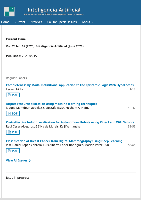
Inteligencia Artificial-Iberoamerical Journal of Artificial Intelligence
Empowering Researchers with Cutting-Edge Insights.Inteligencia Artificial-Iberoamerican Journal of Artificial Intelligence, published by the ASOC ESPANOLA INTELIGENCIA ARTIFICIAL, serves as a pivotal platform for disseminating cutting-edge research in the burgeoning fields of artificial intelligence and software development. Established in 1997 as an Open Access journal, it ensures broad accessibility to its scholarly content, thus fostering collaboration and knowledge exchange amongst researchers, professionals, and students across the globe. Based in Valencia, Spain, the journal currently operates within a significant timeline spanning from 2004 to 2010 and 2012 to 2024, enabling continual contributions to the academic discourse. Although it holds a Q4 quartile ranking in both the Artificial Intelligence and Software categories and a notable yet competitive Scopus ranking among its peers, the journal remains committed to advancing the understanding and application of sophisticated AI methodologies. As it continues to embrace innovative research, this journal stands as a crucial reference point for those keenly navigating the complexities of artificial intelligence in a rapidly evolving digital landscape.
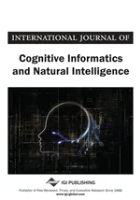
International Journal of Cognitive Informatics and Natural Intelligence
Advancing Cognitive Systems for a Smarter TomorrowThe International Journal of Cognitive Informatics and Natural Intelligence, published by IGI Global, is an essential resource for researchers and professionals exploring the intersections of cognitive informatics, artificial intelligence, and human-computer interaction. Since its establishment in 2007, this journal has focused on advancing the understanding of cognitive systems and their applications in natural intelligence, contributing significantly to the fields of software engineering and interface design. Operating out of the United States, the journal aims to disseminate high-quality research and innovative methodologies to foster interdisciplinary collaboration. Despite its current standing in Q4 quartiles for the fields of Artificial Intelligence, Human-Computer Interaction, and Software, it serves as a vital platform for emerging scholars and seasoned professionals alike seeking to explore new frontiers in cognitive technologies. While it does not provide direct open access, these publications are instrumental in shaping academic discourse, and contribute to ongoing advancements in how we understand and integrate cognitive science into practical applications.

Frontiers in Artificial Intelligence
Leading the Charge in AI Research ExcellenceFrontiers in Artificial Intelligence, published by FRONTIERS MEDIA SA, is a pioneering open-access journal that commenced in 2018, dedicated to advancing the multifaceted field of artificial intelligence. With an impressive Q2 ranking in the category of Artificial Intelligence, it occupies a significant position within the academic community, offering a platform for high-quality, peer-reviewed research. The journal's comprehensive scope encompasses a variety of subfields, including machine learning, robotics, and human-computer interaction, making it an invaluable resource for researchers, professionals, and students alike. As an open-access journal since 2019, it ensures that cutting-edge research is readily available to a global audience, facilitating knowledge sharing and collaboration. With its headquarters in Switzerland and a commitment to scholarly excellence, Frontiers in Artificial Intelligence is at the forefront of the scientific discourse, empowering the next generation of innovations in AI.

International Journal of Fuzzy Logic and Intelligent Systems
Exploring Innovative Pathways in Intelligent SystemsInternational Journal of Fuzzy Logic and Intelligent Systems, ISSN: 1598-2645, is a prestigious journal published by the Korean Institute of Intelligent Systems, dedicated to advancing the fields of Artificial Intelligence, Computational Theory and Mathematics, Computer Science Applications, Logic, and Signal Processing. Established to foster interdisciplinary research, this journal has quickly established its reputation, reaching a respectable Q3 quartile ranking across multiple categories in 2023. It serves as a vital resource for researchers, professionals, and students, offering insights into cutting-edge methodologies and innovative applications of fuzzy logic and intelligent systems. With a focus on disseminating high-quality research, the journal attracts contributions that drive the evolution of intelligent technologies and their practical implications. Published from South Korea, the journal is positioned to impact the global community, facilitating a deeper understanding of intelligent systems in various domains.
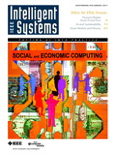
IEEE INTELLIGENT SYSTEMS
Exploring the Future of Artificial IntelligenceIEEE Intelligent Systems, published by the renowned IEEE Computer Society, stands at the forefront of research in the fields of Artificial Intelligence and Computer Networks and Communications. With an impressive Q1 ranking in both categories as of 2023 and Scopus rankings placing it in the top 5% of its field, this journal not only showcases cutting-edge scientific advancements but also serves as a vital resource for practitioners, academics, and students seeking to deepen their understanding and application of intelligent systems. The journal covers a broad range of topics including machine learning, data mining, and system architectures, reflecting its commitment to addressing contemporary challenges and innovations in technology. Although it does not offer open access, the journal's research contributions are invaluable, ensuring that its readership remains engaged with the latest findings and applications in a rapidly evolving field. For those interested in submitting high-quality research or staying updated on the latest developments, IEEE Intelligent Systems represents an essential hub of knowledge.

INTERNATIONAL JOURNAL OF APPROXIMATE REASONING
Navigating the Landscape of Innovative ReasoningThe INTERNATIONAL JOURNAL OF APPROXIMATE REASONING, published by Elsevier Science Inc, stands as a pivotal resource in the domains of applied mathematics and artificial intelligence. Since its inception in 1987, the journal has evolved into a leader in its field, boasting an impressive impact factor and ranking within the top quartile for applied mathematics (Q1) and high standings in artificial intelligence and software categories according to the 2023 Scopus rankings. As researchers, professionals, and students delve into complex issues surrounding reasoning under uncertainty, this journal provides invaluable insights and cutting-edge research. In addition to its rich content, the journal's commitment to advancing knowledge in theoretical computer science further enhances its significance in fostering academic growth. While the journal does not currently offer open access, its rigorous peer-review process ensures that only high-quality, impactful studies are published, solidifying its role as an essential source for academics striving to remain at the forefront of their fields.